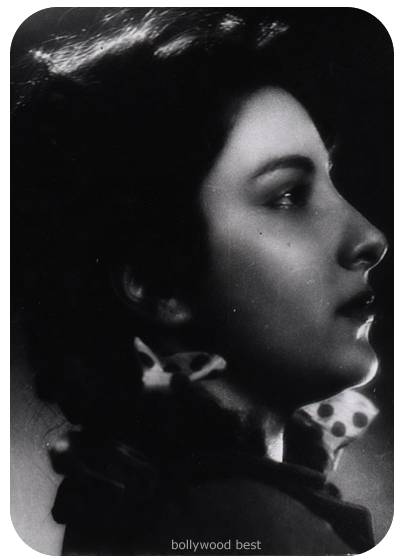arpita
Prime VIP
Nargis - Bio Graphy


[FONT=Arial, Helvetica, sans-serif]A VIRTUOUSNESS SIMILAR TO THAT OF MEENA KUMARI FORMS THE core of the screen personae of Nargis too. Nevertheless, her goodness was of a more earthy variety, one' which did not preclude passions and possessions from its purview. So that, after a night of cavorting on the sand and surf in R.K. Films' Awara (1951), Raj Kapoor aggressively pulls the femme fatale to himself, throws her on the ground and even slaps her. Something which would have beer" sacrilege with the iconic image of Meena Kumari. Needless to say, this was "merely an expression of love on the part of Raju, the rootless vagabond, for Rita, the svelte city-bred girl.- This savagery Essentially was a reaction to her urbane sophistication, born out of a sense of his own insufficiency. And strangely, in an unbridled display of sado-masochism, Nargis views the brutish expression as an extension of machismo in her loved one and is attracted further by his wild ways. [/FONT]
[FONT=Arial, Helvetica, sans-serif]In almost all her films Nargis created an alluring image of the woman who could be desired and deified. The deification was absolute in Mehboob Khan's Mother India (1957) where an ordinary mother acquires a Durgaesque avatar (incarnation of the Hindu deity Durga) in her attempts to keep the family hearth together. Through the character of Radha, the widow who struggles to keep her two sons alive and her virtue intact in an oppressive, feudal and overtly patriarchal set-up, Nargis imbues a divinity to motherhood. Radha then becomes a mother-goddess who not only manages to perform all the duties incumbent on the male and protects her sons from starvation, but also she does it without losing her morality. So that, when her favourite son becomes a fugitive, it is she herself who brings him back to the righteous fold. She curbs her overpowering affections and shoots him, because in her scheme of virtues, a dead son is better than an ignoble one. Radha then becomes a glorious icon for all the good mothers who walked down the aisles of popular cinema after her - mothers who cared for everything. Both the present and the hereafter of their offspring. And mothers who catered to all the needs of their sons - both physical and spiritual. [/FONT]
[FONT=Arial, Helvetica, sans-serif]The charisma of Nargis's screen image lay in the fact that it oscillated quite easily between the simple and the chic. She was the woman who could walk past the censorious eyes in a swimsuit in Awara or find pleasure in the company of two men in Mehboob Khan's Andaz even in the conservative forties. Despite its climactic condemnation of the westernised woman, Andaz (1949) was a landmark film. Fore here was a woman who, contrary to popular belief, did not subscribe to the view that women must find pleasure within the four walls of the house; that women must befriend women, not men; and that the only male permissible in a woman's life, other than her blood relations, is her lawfully wedded husband. [/FONT]
[FONT=Arial, Helvetica, sans-serif]In Andaz, Neeta, the urbane heiress, hires an intense young man (Dilip Kumar) to manage her millions. But More than a professional relationship, the duo enjoy a friendship that eventually becomes the cause of a great big misunderstanding. The dashing young manager misinterprets her bonhomie for love, while Neeta actually marries Rajan (Raj Kapoor), her rich, spoilt betrothed. Rajan too misinterprets the camaraderie between the employer and the employee and the triangular relationship inevitably hurtles towards doom. Naturally, director Mehboob Khan drew a link between Neeta's westernised ways and the emotional tangle that ensues. For, in the beginning itself, at the onset of the drama, her dying father had indicted her free-wheeling ways and predicted the doom. Eventually, Neeta does pay a heavy price for her unconventional behaviour and her city-bred ways. She shoots the manager and ends up serving a prison sentence after being misunderstood and branded as adulterous by her husband. Nevertheless, Neeta remains an important fact in Nargis's screen personae.[/FONT]
[FONT=Arial, Helvetica, sans-serif]But more than the Ritas and the Neetas, Nargis lives as Vidya, the good woman of the 1950s. Vidya, the upright heroine of R.K. Films' Shri 420 (1955), who was virtue incarnate. Hers was the good, clean life of morals that followed the dictates of nothing but conscience. Neither love, nor money - the other two prime motivations - had the power to steer her off her chosen path of principles. Vidya was the woman who was willing to walk beside the downtown tramp, Raju (Raj Kapoor), despite his jobless, penniless, homeless state. Simply because she had seen the medallion of honour that had been bestowed on him for his integrity. But when Raju pawned his principles along with the medallion for a pocketful of gold, the schoolteacher closed the door on his face. A handful of green bills, the high road to material success and a promise of plenitude were not temptation enough. Vidya was willing to kill the surging passion of her love for the light-eyed Romeo rather than waltz with him on the high road to crime.[/FONT]
[FONT=Arial, Helvetica, sans-serif]If Raj Kapoor's Shri 420 was an ode to the essential India that had been nurtured on the dream of post-partition bliss, then Nargis's Vidya was the idea of that Indianness. One that was both uncorrupted and incorruptible, despite the lure of the fast buck, easy money and an unscrupulous accumulation of wealth in an encompassing winter of discontent. Vidya, the winsome woman in the simple, starched sari, was the prize to be had, after one had cleared the class of morals and had passed the integrity test. She was the medallion that would adorn only the lapels of the honest Indian. If in Shri 420 she stretched out her hands to the hero only after he had relinquished his fraudulent ways, then in Sombhu Mitra's Jagte Raho (1956) she was the mysterious woman who quenched the thirst of the lone ranger who scourged through the city's underbelly in search of water. She came only at the crack of dawn, when the long, lonely night had reached its dismal end. She came as a life-saver, a guardian angel or an apsara who asked nothing, knew everything and simply nurtured. But her elixir was only for the deserving ones. Those who carried with them the heart and soul of the essential Hindustani. [/FONT]


